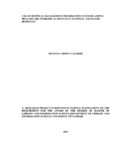| dc.description.abstract | Health decision making is critically dependent on accurate, timely and reliable information. There is evidence to indicate that most of the national and sub-national health information systems fail in providing much needed information support for evidence based health planning and interventions. This situation is more acute in developing nations where resources are either stagnant or decreasing, coupled with the situations of demographic transition and double burden of diseases. Health information system failure is widely blamed for this situation. Improved information use requires improved quality of data and information products, which in turn requires effective health information systems. Decisions on what information systems to adopt have often been made without evidence of effectiveness; or information on implications; or extensive knowledge on how to maximize benefits the systems. This study examined use of the hospital management information systems among healthcare workers at Mater Hospital and Kenyatta National Hospital. The study objectives were to: assess the use of the hospital information system in both hospitals, establish the extent to which the software system provides accurate and relevant information of the patients. The study established the challenges being experienced using the hospital information management system in both hospitals and suggested possible solutions to improve the system. Descriptive survey was applied involving both quantitative and qualitative approaches. Structured questionnaire and document reviews were used to gather data. Respondents in both hospitals were healthcare workers. Health information system deal with data quality and is characterized by the relevance, accuracy, timeliness, and completeness of data while health system performance looks at decision makers explicitly considering information in policymaking, planning, management, and service delivery. The finding of the study has established both hospitals concurred hospital information management system provides accurate and relevant patient information and other useful data needed to effectively manage patient care and govern the health facility well. The study has also established that modern and sufficient information communication and telecommunication equipment are required in order for the system to deliver desired results. Training of healthcare workers and continuous support is also of paramount importance according to the findings of the study. | en_US |

